
Publisher:
Bonnie King
CONTACT:
Newsroom@Salem-news.com
Advertising:
Adsales@Salem-news.com

~Truth~
~Justice~
~Peace~
TJP
Jun-26-2007 10:28

 TweetFollow @OregonNews
TweetFollow @OregonNews
An Inside Look at the Helmand Province in Southwest Afghanistan
Zmarial for Salem-News.comAn Afghan citizen reports on the true situation in Helmand Province where many Western Coalition forces have fought and died. Helmand province has 12 districts and the capital of Helmand is Lashkargah, the 12 districts are as following: 1: Nad Ali, 2: Nawa-e-Barakzai, 3: Garamsier, 4: Khanashin, 5: Dishu, 6: Nahrisiraj, 7: Nazad, 8: Washir, 9: Sangin, 10: Musa Qala, 11: Kajaki, 12: Baghran
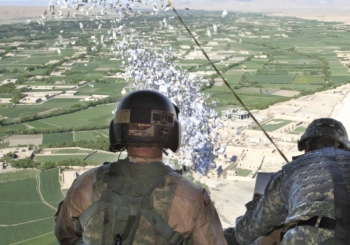 Distribution of leaflets over Helmand Province by the U.S. military, Photo courtesy: U.S. Army. Other photos courtesy: heal911.com, watchingamerica.com and worldproutassembly.org |
(HELMAND, Afghanistan) - Helmand province is located in the southwest of Afghanistan and had an estimated population of 799,000 in 2006 as per report of Central Statistic of Helmand Afghanistan, and the surface area is 61829 Km², (23872.310 mi²) which could be called the largest province of Afghanistan.
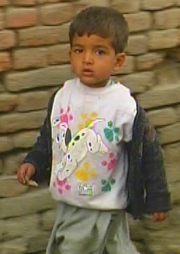 Small boy in Afghanistan |
Helmand province has 12 districts and the capital of Helmand is Lashkargah, the 12 districts are as following:
1: Nad Ali, 2: Nawa-e-Barakzai, 3: Garamsier, 4: Khanashin, 5: Dishu, 6: Nahrisiraj, 7: Nazad, 8: Washir, 9: Sangin, 10: Musa Qala, 11: Kajaki, 12: Baghran
Helmand province has a border with Pakistan, and could be divided into three parts: 1. Northern Helmand. 2. Central Helmand. 3. Southern Helmand. 1. Northern Helmand lies to the north of the paved main road and consists of Sangin, Washir, Naw Zad, Musa Qala, Kajaki and Baghran. The largest tribe in Helmand belongs is the Alizai tribe, then after them the Noorzai, Barakzai and Ishaqzai tribes. The majority of the people in Musa Qala, Kajaki and Baghran, the districts which contain (23.5%) of Helmand’s population are from the Alizai tribe; the majority of the people in Naw Zad, which contains (5.6%) of Helmand’s population, are from the Noorzai and Ishaqzai tribes. The majority of Washir which contains (1.7%) of Helmand’s population are from the Noorzai tribe; the majority of Sangin which contains (6.6%) of Helmand’s population are from the Alikozai and Ishaqzai tribes.
2. Central Helmand: the majority in Nahri Sarraj, a district which contains (12.9%) of Helmand’s population are Barakzai; the majority of people in Lashkargah, the provincial capital of Helmand which contains (11.2%) of Helmand’s population are also Barakzai. The majority in Nad Ali, which contains (13%) of Helmand’s population are Kharoti and Dotani tribes.
3. Southern Helmand: the majority of Nawa-e-Barakzai, which contains (10.3%) of Helmand’s population are from the Barakzai Tribe, the majority of Garamsier, which contains (9.7%) are from Noorzai and Alizai tribes; the majority of the people in Khanashin and Dishu districts which contains (5.2%) of Helmand’s population are from the Ishaqzai tribe.
HELMAND AFTER THE FALL OF TALIBAN
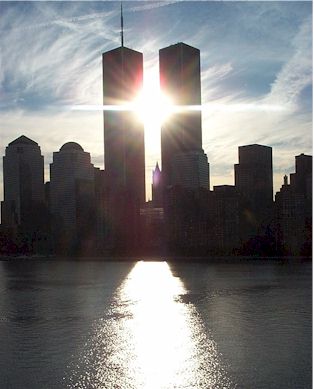 After ‘9/11’ when the US and its coalition invaded Afghanistan, the Taliban fled from Helmand and the whole of Afghanistan; thus Mullah Shir Muhammad Akhundzada was appointed by the central government as Governor of Helmand province.
After ‘9/11’ when the US and its coalition invaded Afghanistan, the Taliban fled from Helmand and the whole of Afghanistan; thus Mullah Shir Muhammad Akhundzada was appointed by the central government as Governor of Helmand province.
Mullah Shir Muhammad Akhund is the son of the late Muhammad Rasool Akhund governor of Helmand in the time of the Mujahedin. The late Mullah Nasim Akhund and the late Mullah Ghafar Akhund, both Governors during the time of the Mujahedin, are the uncles of Shir Muhammad Akhund. They all are affiliated to the Harkati Islami political party and come from Nicha village in the Kajaki district of Helmand. Mullah Nasim Akhund, the elder uncle of Shir Muhammad, stayed as Deputy Defense Minister of Afghanistan during the time of the Mujahedin. The people of Helmand believe the father of Shir Muhammad Akhund was the person who saved the people of Dr. Najeeb’s Government from being killed by the Mujahedin during the 1990’s when the Mujahedin took power in Lashkargah in 1993. Mullah Shir Muhammad Akhund was living in Quetta in Pakistan during the time of the Taliban regime; his uncle Mullah Ghafar Akhund was assassinated in Quetta and the Taliban were blamed for carrying out the assassination. His elder uncle Mullah Nasim Akhund was assassinated in Peshawar in the NWFP Province of Pakistan, and the Hizbi Islami Hikmatyar Party was blamed for carrying out the assassination.
The family of Mullah Shir Muhammad and the tribe which he comes from were some of the reasons he became Governor of Helmand. Mullah Shir Muhammad was a very powerful Governor of Helmand which was unique from 2001 up to now; from the beginning of his career as governor until the end of 2005 the security situation in Helmand was much better than other southern provinces and during this time he was a key ally to president Karzai and the Americans, and was very opposed to the Taliban rebels.
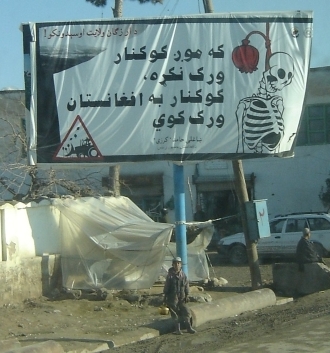 Sign in Helmand Province warns that opium poppies |
On the other hand Poppy elimination, smuggling, hiring of suitable and educated people for high government positions and some other matters were ignored completely. Most high government posts like the positions of provincial police commander, National Directorate of Security (NDS), Division # 93, Finance Dept., Transport Dept., Education Dept., Culture and Information Dept. etc. were given to those who'd had a very active role in internal fighting and other criminal activities during the 1990’s.
As regards the situation at that time, it was a good decision because the government wanted to get the support of tribal elders and the warlords because they were engaged in fighting with the Taliban and Al-Qaeda. During the governorship of Mullah Shir Muhammad the provincial police commander, deputy provincial police commander, police chief of staff, chief of city police, spokesman for the police commander, crime branch officer, director of tribal and boundaries affairs, and most of the district police commanders were from the Noorzai tribe.
The Governor, deputy governor, spokesman for the Governor, chief of staff or chief executive, director of education, finance officer, and many District chiefs or district administrators were from the Alizai tribe. The NDS was dominated by the Alikozai tribe, the Health Dept. was from the Hazara minority of Helmand, and the Culture and Information Dept. was from the Ghilzai tribe for some time. Some directorates were held by the Barakzai tribe but the fourth major tribe in Helmand, the Ishaqzai were not given any part in government, hence they joined the warlords and Taliban rebels.
The poppy problem also damaged the governorship of Shir Muhammad. Even though he was getting full support from the USA and President Karzai, he still couldn’t eliminate the poppy, which has destroyed the reputation of Helmand and the whole of Afghanistan internationally. After spending millions of dollars to remove the poppy from Helmand, there is no positive change in even reducing the poppy in Helmand. The amount of poppy planting in Helmand is increasing each year.
It seems that the Afghan government and the international community have lost their way in removing the poppy from Helmand. It was poppy which destroyed the reputation of Governor Shir Muhammad, it was poppy which damaged the loyalty of Shir Muhammad, it was poppy which brought many local people into opposition to the government and brings instability in the province. In 2003 the government decided to pay the farmers after eradicating their poppy, but this process didn’t work because the money did not reach the farmers. The money went into the hands of some of the higher government officials and to some tribal elders. This action divided the local farmers and the government.
Another point that caused instability and human rights violations in Helmand is that tribal elders and warlords were fully supported from 2001–2005, and police were given many weapons including more than 900 guns which seem to have vanished now. These weapons were handed out by the Americans after the failed DDR process on which considerable money was spent.
The same warlords in the districts and tribal elders and others who were involved in human rights violations, and heavily involved in drug trading, were given much more support by the Americans, and are now a headache for the government. The USA should be held responsible for this.
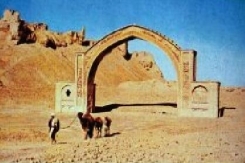 Lashkargah, capitol of the Helmand Province |
Meanwhile in December, 2005 Mullah Shir Muhammad was removed from his position and was appointed a senator in the national assembly by President Karzai. The removal of Shir Muhammad happened at a time when there was no proper replacement for him. It was stated above that Shir Muhammad came from a very powerful family and tribe, and he became more powerful during the time he was governor and gained much local support.
At the same time many warlords and drug lords were also powerful, and were well equipped with weapons because of the easy-going and generous attitude of the Americans. In such circumstances the removal of Mullah Shir Muhammad was bad idea. It should have been done step by step until there was a proper replacement for Shir Muhammad; one who could be representative of the powerful tribes, popular amongst the local people, and with diplomatic skills - who could get the full support of the funds for reconstruction, international representatives, tribal elders and local people.
But Engr. Daud was brought in as Governor of Helmand, who belonged to the Safi tribe and was affiliated to Hizbi Islami Hekmatyar, and was a key British ally. All these steps were not taken carefully, which resulted in British troops becoming involved in direct fighting in Helmand from the moment of their arrival.
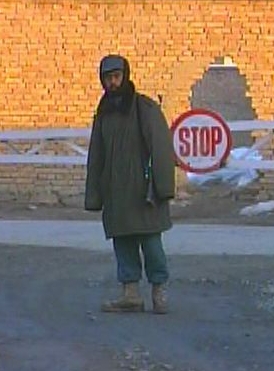 Afghan National Policeman Photo by: Tim King |
As a result, the uncle, nephew, relatives, and some commanders of Mullah Shir Muhammad, also one son and two brothers (one of them was NDS director of Sangin district and another was District chief of Sangin) and thirty other supporters and the commander of the previous NDS chief, Jihadi Commander and now MP Amir Dad Muhammad Khan (DMK or ‘Dado’) were killed in Sangin district. The 30 supporters were killed in direct fighting with Taliban rebels in Sangin. Coalition forces and ANP were asked for support but didn’t support them (DMK or Dado mentioned in interview with media shortly after the incident), which shows the government was happy about the removal of his family.
The Government fired Abdul Rehman Jan (ARJ), police commander of Helmand, and took control from his commanders in the districts while they still had plenty of weapons, and sat at home doing nothing. Announcement of poppy elimination and sluggishness in reconstruction contributed to increasing opposition to the government, and the government lost control of the districts day by day.
In 2006, poppy production reached its highest level, and when the time for poppy eradication arrived. the government and international community contributed more than 70 million dollars to eradicate poppy, but couldn’t do so because high government officials took millions of dollars in bribes from farmers and Mafia groups, and did not eradicate poppy. This action of the government also increased the distance between the people and the government which resulted in instability in Helmand, and the rebels found their way from the mountains to the district centers and even Lashkargah, the provincial capital of Helmand where thousands of British troops are based. The British were under a lot of pressure and were engaged in fighting in many parts of Helmand.
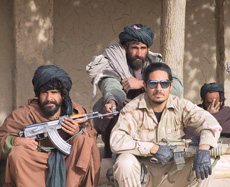 In the summer of 2006 NATO forces were in fierce combat with Taliban rebels in Musa Qala, a northern district of Helmand. On 17 October 2006, after more than a month of fighting, the British left Musa Qala, and handed over control to local elders. The Musa Qala agreement was a golden opportunity for British forces to rest for a while and learn more about the province and its cultural and tribal structure. On the other hand, the Musa Qala agreement was more than a golden opportunity for the Taliban rebels and drug lords. The Taliban were able to make Musa Qala their military base and operate from there into other districts and even in Panjwai and Jiri districts of Kandahar.
In the summer of 2006 NATO forces were in fierce combat with Taliban rebels in Musa Qala, a northern district of Helmand. On 17 October 2006, after more than a month of fighting, the British left Musa Qala, and handed over control to local elders. The Musa Qala agreement was a golden opportunity for British forces to rest for a while and learn more about the province and its cultural and tribal structure. On the other hand, the Musa Qala agreement was more than a golden opportunity for the Taliban rebels and drug lords. The Taliban were able to make Musa Qala their military base and operate from there into other districts and even in Panjwai and Jiri districts of Kandahar.
Several times the Taliban supported their friends in Panjwai and Jiri districts from Musa Qala, drug lords got an opportunity to collect the opium from other districts and other provinces in Musa Qala, and process it in laboratories and send it out of Afghanistan. But during the fighting, many residents of Musa Qala district abandoned their homes and went as refugees to Lashkargah and other districts.
The Mafia and Taliban, who receive much economic support from poppy, were worried about the poppy planting because of the ongoing fighting and people leaving their lands and houses, so they thought: "Let's sign an agreement, so that the locals can return home and plant poppy". It is very clear that if the agreement was not signed, there would have been no poppy planting in many northern districts in 2006. Looking at all the above factors, the Musa Qala agreement was short-term and for specific objectives from both the government and the Taliban side.
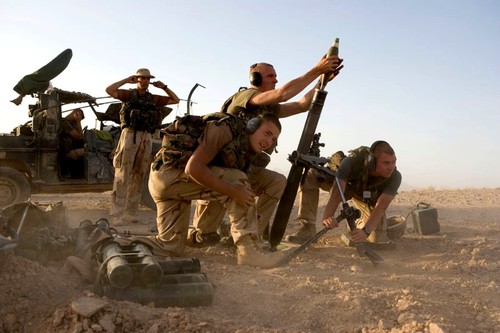 The possibility exists that the Taliban drug lords may have had a hand in the agreement being signed, and that the elders were encouraged to endorse the agreement. The agreement was for specific objectives, and while achieving its aim, the agreement was becoming weaker day by day. Meanwhile, the USA was publicly objecting to the agreement. The agreement was not implemented as signed; as the Taliban frequently appeared in Musa Qala, and on the other side the government and international community didn’t do any kind of construction work in the district. The agreement lasted for three months, but not a single reconstruction project was seen there.
The possibility exists that the Taliban drug lords may have had a hand in the agreement being signed, and that the elders were encouraged to endorse the agreement. The agreement was for specific objectives, and while achieving its aim, the agreement was becoming weaker day by day. Meanwhile, the USA was publicly objecting to the agreement. The agreement was not implemented as signed; as the Taliban frequently appeared in Musa Qala, and on the other side the government and international community didn’t do any kind of construction work in the district. The agreement lasted for three months, but not a single reconstruction project was seen there.
After less than two months, the disagreement between the USA and the UK came into the open - after the sacking of Daud, a key British ally in carrying out vital reforms and the architect the of Musa Qala agreement. Independent news in the UK wrote on the 10th of December, 2006 that British intelligence officers and military commanders had accused the US of undermining British policies in Iraq and Afghanistan, after the sacking of a key British ally in the Afghan Province of Helmand. British sources have blamed pressure from the CIA for President Karzai’s decision to dismiss Muhammad Daud as Governor of Helmand. EURASIA INSIGHT news wrote on February 5th, 2007 that Gen. Dan McNeill is believed to oppose the type of local peace arrangements that Gen. David Richards promoted.
The British believed that Eng. Daud was their key ally and a key player in Britain’s anti-drug campaign in Helmand, even though poppy production hit a record level in 2006 while Eng. Daud was governor of the province, and enjoyed the full support of Britain. As stated before more than $ 70 million were spent on the poppy eradication campaign, but Governor Daud didn’t prevent the bribery, by poppy planting he himself became involved in this business and gained lots of money.
Now questions arise whether Eng. Daud was really the ally of Britain? Was Governor Daud not encouraged by drug lords to be the architect of the Musa Qala agreement?
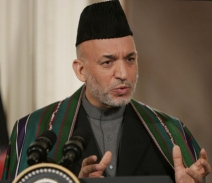 Afghan President Hamid Karzai |
Wafa was affiliated to the Harkati Inqilabi Islami political party which was formed by Malawi Muhammad Nabi Muhammadi; the family of Mullah Shir Muhammad Akhund was also affiliated by Harkati Inqilabi Islami. On the appointment of Wafa, the people of Helmand were still pessimistic about the future because they knew that changing of governors will not work until the main problem between the UK and the USA is solved, and until Pakistan closes down the sanctuaries of the terrorists in Balochistan and NWFP. The result is the same and people were thinking the situation down in Helmand would go downhill more than in 2006.
In 2007 the Musa Qala agreement received publicity in many countries, especially those who were here to defeat Al-Qaida and the Taliban. Many people were observing the agreement very closely, but the locals particularly were very much concerned by the agreement. When poppies were processed and poppy planting finished. The Taliban and British rested for a while and re-equipped themselves. On 2nd February 2007 dozens of Taliban rebels entered Musa Qala district center and wrecked the district administration building, set the Afghan national flag on fire, and captured the local elders who had signed the Musa Qala agreement under which NATO troops agreed to withdraw from Musa Qala and let local elders take charge of the district.
After two days, on the 4th of February, as a result of NATO aerial bombardment, Mullah Ghafoor died. Mullah Ghafoor was the main figure in the breaching of the Musa Qala agreement and the capturing of the local elders, and after some days Mullah Manan was also killed by NATO troops. Mullah Manan was also known as a famous Taliban commander and he had an active role in taking control of Musa Qala on February 2nd. Mullah Manan was believed to be responsible for wreckeing the district administration building of Musa Qala.
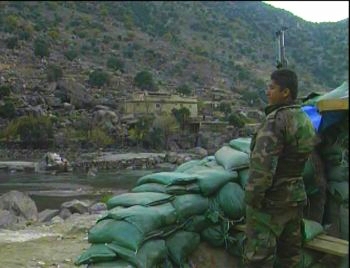 Afghan National Army soldier on the Pakistan border |
Many terrorists can easily get logistical support and places to hide themselves in Helmand, which local government security officials are believed to be linked to. In March 2007 Governor Wafa reported that approximately 700 terrorists from various nations such as Chechnya, Saudi Arabia, Pakistan, etc. are in Sangin district. Now where did these terrorists come from and how did they arrive in Sangin? Sangin district does not have any border with neighboring countries, so if they have entered Afghanistan from Spin Boldak on the Kandahar border they have certainly crossed through many villages before they have arrived in Sangin, or if they entered from the southern district of Dishu in Helmand they have certainly crossed through Dishu, Khanishin, and Garamseir districts before they could get to Sangin.
These people are entering Afghanistan undetected across a border which the Afghan government claims is not secured, but the local districts and villages are under the control of the Afghan Government, so when these terrorists of different nationalities were crossing so many districts, where was Afghan intelligence, the ANP and ANA? It is completely impossible that unidentified terrorists should cross so many villages and that the government which has intelligence, national police, and national army, should not be aware of it!
The world understands that Pakistan trains terrorists and sends them into Afghanistan to cause terrorism in Afghanistan. On 6/10/2006 EURASIA INSIGHT wrote that during the fighting, the Taliban fired an estimated 400,000 rounds of ammunition, 2,000 rocket-propelled grenades, and 1,000 mortar shells, which had gradually arrived in Panjwai, a district in Kandahar province, from Quetta over the spring months. Ammunition dumps unearthed after the battle showed that the Taliban had stocked over one million rounds in Panjwai.
NATO estimated the cost of Taliban ammunition stocks alone at around $5 million. “There is no way the Taliban could have done this on their own without the ISI” said a senior NATO officer. As mentioned before the DDR process failed in Helmand and many weapons which the warlords, drug lords and Jehadi commanders had got during the civil war were still kept by people like Mullah Shir Muhammad Akhund, Daud Muhammad Khan, Mir Wali, Abdul Rehman Jan, and Abdul Wahid Khan (Rais Baghran), and it is believed that they may have given their weapons to the Taliban after they were thrown out of power from government positions in 2005-2006.
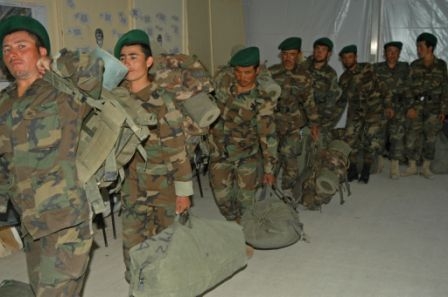 Afghan National Army soldiers at Helmand Province Photo: DoD |
Above all the Afghan people and government also have a responsibility to keep a close eye on all these and keep Afghanistan free from terrorists. If terrorists are coming from Pakistan, where do they go? Where do they sleep? Afghan local government is helping them to enter villages where Afghan villagers and local elders are providing places for them to hide.
We see these tribal elders or religious elders of Afghanistan are the people from whom Afghanistan is suffering; they are the people helping terrorists, growing poppy and wanting to legalize poppy. In other countries many economic problems exist, especially in backward countries, but every time economic problems occur and people live in poverty, and in more miserable conditions than in Afghanistan, they don’t grow poppy. The Afghan constitution and religious edicts of Ulemas clearly ban poppy planting, the use and trafficking of drugs, but tribal elders do not listen to all of that but encourage people to grow poppy, which lends much support to terrorists and drug lords and destabilizes the government.
The International community has given more importance to tribal elders than they really deserve. Tribal elders in Afghanistan are not the same as in the past, now Afghans have traveled the world to many progressive countries and they are familiar with their benefits.
They prefer liberty, but because of illiteracy there is no national ideal among them. If a personal profit lies in the decisions of the tribal elders they respect that decision, even if it damages the country; but if there is no personal profit in the decision of tribal or religious elders they will not listen to it, even if it is favorable to society. A very good example is the Musa Qala agreement; when drug lords, Taliban and some locals saw the benefit to themselves in the agreement they respected the decision of tribal elders and they accepted the agreement, but when the Taliban, drug lords and locals achieved their goals in Musa Qala, they began imprisoning tribal elders. These self-proclaimed provincial and national tribal elders then escaped and are now living in Lashkargah or other provinces; some of them even moved to other countries.
Thus if they really have the same role that they had in the past, they would not be imprisoned and insulted by the Taliban, and would not be escaping from their own home villages and the tribes which they claim they are the leaders or elders of. Tribal elders have very clearly pointed out their role in the Musa Qala agreement and when they were arrested it proved that they are no longer in the position or of the status that they used to have in the past in Afghanistan.
Of the many international organizations currently working in Afghanistan, some foreign contractors are present who do not deserve to be here. They are not working effectively, which may have many reasons. - Some of them are unable to do the work because they are incompetent or undertrained, and some are here for just a few months. Their contracts are so short that they only count the days to going back to their real lives. Many other reasons may exist as well. For these reasons, there is no cost effectiveness analysis of work, no monitoring of the projects, and money goes into the wrong hands and is being spent on useless projects.
The solution to the problems can be traced to the following five issues.
1. A mutual understanding between the US and the UK is required. 2. Control of Borders. 3. Poppy Elimination. 4. Domestic Corruption. 5. Upgrading intelligence services and security forces.
1- MUTUAL UNDERSTANDING BETWEEN US & UK IS MUST
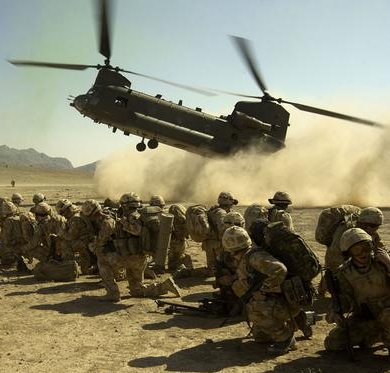 Op Silica Now Zad, Helmand Province Afghanistan: A CH-47 comes in |
Besides all this, the UK holds the responsibility of eliminating poppy from Helmand and is engaged in direct fighting with the Taliban and other insurgents. Britain should work with those Afghans who are really their allies in the anti-drug process and allied to them in bringing peace and implementing reconstruction projects in the province. Not only in their words - they should also prove with their actions that they are really key collaborators for Afghanistan and Britain.
2- CONTROL OF BORDERS
Helmand Province has approximately 1,200 km of border with the southern neighboring country, Pakistan. Many times it has happened that terrorists have crossed the border, performed their terrorist activities, and gone back to Pakistan very easily. The government has the responsibility as well as the international community who are here to bring security to and rebuild Afghanistan to control the borders of Afghanistan and prevent terrorists from entering Afghan territory. Borders are as important to a country as a door is to a house; if a house is full of treasure and other valuable things and it has no door, of course thieves will enter the house and steal things and damage the house. Now our country is without a door!
Even our leaders and people know that we have thieves among us who have kept close eyes on us. Helmand province has border police who have been sent to Nimroz province. We need them here rather than in Nimroz province. As soon as possible the government should take important steps toward securing the border; if the government is unable to do this it should ask the international forces whose priority is securing Afghanistan.
If international forces have any doubt that terrorists are coming across the border, let them go to the nearest provincial headquarters of Baluchistan in Quetta where Jamiat-e-Ulema Islam have got control of government offices, the Taliban gets training in madrasas quite openly, preaching is going on in local bazaars urging Muslims to start a Jihad in Afghanistan because westerners and Americans have occupied Afghanistan. Many anti-Afghan government elements and terrorists have obtained refuge there; prime examples were the capture of Khalid Sheikh Muhammad, the third most important person in Al-Qaida, the capture of Lutfullah Hakimi, a spokesman of the Taliban regime (who is believed to have been released along with four other Taliban commanders by the Afghan government in exchange for the release of Daniel Mastrogicomo, an Italian journalists who was captured in Helmand by Taliban in March 2007).
The Afghan Government has captured many people during the investigation and the accused captives admitted that they were sent by Pakistan for terrorist purposes. The EURASIA INSIGHT wrote on 6 October, 2006 that NATO captured 160 Taliban, many of them Pakistanis, who described in detail the ISI’s support for the Taliban. Previously, Pakistan’s President General Pervez Musharraf acknowledged that some Al-Qaeda members are crossing the border because the border is long, and patrolling a long border is very difficult because of the lack of Army personnel. The Pakistani President clearly accepts that terrorists exist in Pakistan, and it was mentioned before that training camps for terrorists and campaigning for Jihad in Afghanistan is continuing in Pakistan, therefore the international forces who are here to defeat terrorists should go into Pakistan and start their operations inside Pakistan to eliminate the sanctuaries of the terrorists.
3- POPPY ELIMINATION
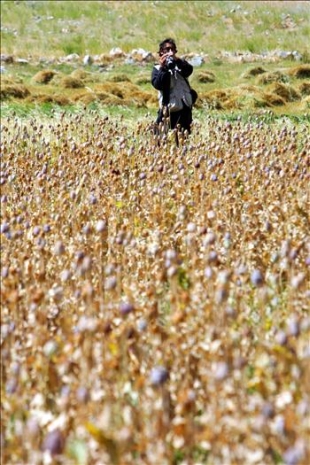 Poppy has been planted for a very long time in Helmand, especially in northern districts such as Baghran, Kajaki, Musa Qala etc. These districts were never under the full control of the government.
Poppy has been planted for a very long time in Helmand, especially in northern districts such as Baghran, Kajaki, Musa Qala etc. These districts were never under the full control of the government.
These districts do not have proper irrigation systems, agricultural lands are very limited, thus the people were compelled to plant poppy to earn a living. Poppy planting increased in Helmand when the Mujahedin took control of Helmand during the 1990’s. That was the time when Helmand became the base of Mafia groups and they even set up laboratories to process poppy into heroin. Warlords were running the government; poppy supported local farmers economically, as well as supporting the Mafia and warlords to a much greater extent.
After the collapse of the Taliban extremist regime, from the start of Karzai’s government, many tricks were used and millions of dollars spent to eliminate poppy, but unfortunately the government and international community couldn’t even reduce poppy in Helmand. Finally poppy production hit its record level in Helmand in 2006.
What are the problems that make poppy planting increase in Helmand instead of reducing?
• Government implemented short-term strategies each year. • The national strategy for poppy elimination was not wide-ranging.. • AL/Reconstruction projects were very slow and too small. • Dominance of drug lords in high level Government positions. • Corruption in eradication process.
Is there a solution for eliminating poppy from Helmand?
YES – The following are the solution to fighting poppy production.
(i) Making a new national strategy for poppy elimination. (ii) Implementation of long-term plans. (iii) Hit the war lords and drug lords in high level government positions. (iv) Economic Development. (v) Demand reduction in involvement of foreign countries.
I. MAKING A NEW NATIONAL STRATEGY
To fight poppy production in Afghanistan properly, especially in Helmand, there should be a comprehensive national strategy which would cover all issues related to poppy production, smuggling and usage.
II. IMPLEMENTATION OF LONG-TERM PLANS.
The Afghan government has implemented separate plans for poppy eradication each year. At first, the government has proposed nothing except poppy eradication to farmers; the second plan was for the government to give $300 to farmers after eradication of their poppy fields, the third plan was providing alternative livelihood programs in those areas where the government was eradicating poppy, and finally in 2006 & 2007 there was nothing for the farmers after eradicating their poppy.
As a result of these short-term plans, there is virtually no success; these short-term plans widened the distance between the public, particularly farmers, and the government, hence the government and international community, in particular those countries who are really affected by drugs, should work together on a long-term effective plan and donate funds according to the requirements of the plan, which should cover all issues such as raising the level of the Afghan economy and improving the economic state of farmers.
III. HIT THE WARLORDS AND DRUG LORDS
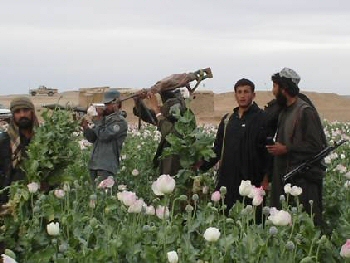 Poppy eradication in Afghanistan; many say it is not the answer |
Another major point is the penetration of drug lords at high levels of provincial and central government. The issue arises here that despite the awareness of President Karzai and the international community, this problem is still not solved. Ali Ahmad Jalali, the former home minister of Afghanistan, stated several times that high ranking government officials are involved in drug trade but was unable to reveal their names. Media has reported several times that “Some Afghan ministers are deeply implicated in the drugs trade”.
In Helmand poppy is being planted openly everywhere in each district, even in the provincial capital Lashkargah, near to the compound where the Provincial Reconstruction Team, led by Britain’s troops, are based. This despite the fact that under Article 7 of the Afghan constitution planting, trafficking and usage of poppy is strictly banned. Each year the Government appoints a special commission for poppy eradication with high ranking provincial government officials as members. Sometimes the Governor chairs the commission and members are from the Provincial Police, Provincial attorney general’s office, Provincial council, directorate of counter-narcotics etc., but no one can be held accountable as to why eradication failed and bribes were taken from farmers.
Yes, the government has taken some action; it has changed the members of the commission, but no one is taken to court to clarify why the process failed. -- Instead they have sent other corrupt officials to fill their pockets, and nothing else. Thousands of hectares of government land is forcibly occupied by warlords and drug lords.
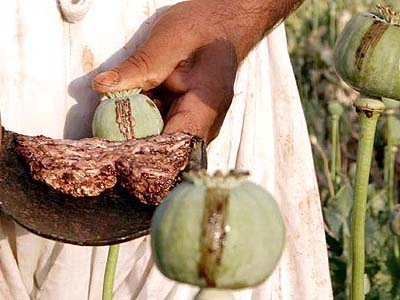 There was approximately 76,433 hectares of desert and green area set aside for nomads (kuchis) in Garamsier, around Marja, at Chahanjir in Nad Ali, around Nahri Sarraj district, between Nahri Sarraj and Naw Zad districts and between Maiwand district of Kandahar and Helmand and so forth, but currently a large part of this desert is occupied by warlords, drug lords and others. They plant poppy in this area each year. There was approximately 18,508 hectares of natural jungle; most of it was located alongside the Helmand river. 90% of these jungles have been cut down and made into agricultural lands by warlords and drug lords, and they are planting poppy every year in these areas.
There was approximately 76,433 hectares of desert and green area set aside for nomads (kuchis) in Garamsier, around Marja, at Chahanjir in Nad Ali, around Nahri Sarraj district, between Nahri Sarraj and Naw Zad districts and between Maiwand district of Kandahar and Helmand and so forth, but currently a large part of this desert is occupied by warlords, drug lords and others. They plant poppy in this area each year. There was approximately 18,508 hectares of natural jungle; most of it was located alongside the Helmand river. 90% of these jungles have been cut down and made into agricultural lands by warlords and drug lords, and they are planting poppy every year in these areas.
Another severe problem caused by cutting down this jungle is that now the water of the Helmand River often changes its route and hits many villages and destroys agricultural lands and many houses. Approximately 33,321 hectares of land was dedicated to farms such as dairy farms, poultry farms, research farms, artificial forests where trees were planted for paper production, and market gardens in different districts of Helmand. The most important and famous farms were Bolan farm, Gorgin Farm of Nawa district, Marja farms in Nad Ali, Hazar Joft farm of Garamseir etc. Most of them are occupied by these same people - many drug and warlords are planting poppy all over these lands. As soon as possible, the government should reclaim its property from these warlords and drug lords. In 2005 American forces came by helicopter to the houses of the drug lords and seized large amount of drugs; many smugglers were captured which put fear into the hearts of many remaining smugglers. Many of them stopped this trade, but unfortunately they were quickly released. Occupation by the Americans encouraged even more local people to start in the drug trade in Helmand.
IV. ECONOMIC DEVELOPMENT
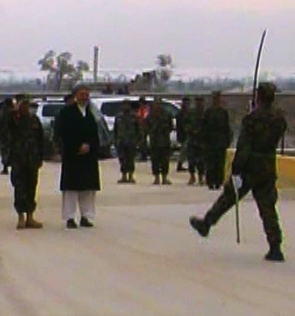 Afghan Vice President Abdul Karim Khalili |
• The government should try to find markets for other crops for Helmand’s farmers like cotton, sunflower, saffron, wheat, fruits and so on. The government should have a subsidy system in Helmand to buy the crops from Helmand’s farmers at a high price or to provide opportunities to the farmers of Helmand to grow other crops and process them. For example, the private sector or the government could establish factories in Helmand and buy the sunflower seed, process it into oil, and sell it in the market, or make a cold storage system for the fruit of Helmand during the harvest season.
The farmers of Helmand sell their fruit very cheaply because they cannot store it; the same fruits, onions, potatoes, vegetables etc. are going to neighboring countries which keep them in storage and send them back to Afghanistan to sell at a very high price to the people of Afghanistan. If opportunities are provided such as factories and cold storagej, this would be very effective in reducing poppy production. The government can reallocate the millions of dollars which are being used each year for poppy eradication with no real result.
• As unemployment increases, the insurgency increases, because there is an inverse relationship between employment and insurgency, therefore to get rid of unemployment the donor agencies and private sector should start their activities in Helmand. Effective reconstruction projects according to the demands of the people, which could employ many people, should be given priority in the area where poppy planting is increasing... As in all districts including the provincial capital Lashkargah, there has been no appreciable project implemented in the last six years, and still many school children study under tents, as there are no classrooms for them.
Many roads remain in bad condition; millions of dollars are disbursed but with no positive result, maybe because of the lack of monitoring by donor countries. The Kajaki dam and road project to increase the capacity of Kajaki hydroelectric dam could be credited as an effective project which will be starting in the near future, and will be employing more than 2,500 people to work on it. More than $180 million is allocated for this project, and the donor countries and the Afghan government must keep a close eye on the expenses of the project which must go into the right hands.
V. DEMAND REDUCTION IN FOREIGN COUNTRIES
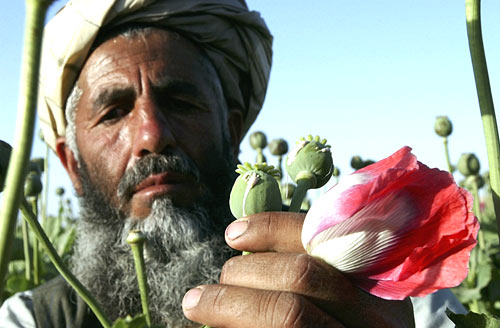 Afghanistan is the world’s biggest narco-state and Helmand is Afghanistan’s biggest narco-province, but after the production of opium where does it go? Where is the real market for the drug? How does it arrive in the USA, UK, Saudi Arabia, Iran, Turkey, and in other European and non-European countries despite them having modern technology, well-trained security forces and a developed security system? The production of poppy in Afghanistan is in response to the demand in the USA, European and other countries, so although controlling poppy production in Afghanistan is important, demand reduction in other countries is equally as necessary as controlling poppy production in Afghanistan itself.
Afghanistan is the world’s biggest narco-state and Helmand is Afghanistan’s biggest narco-province, but after the production of opium where does it go? Where is the real market for the drug? How does it arrive in the USA, UK, Saudi Arabia, Iran, Turkey, and in other European and non-European countries despite them having modern technology, well-trained security forces and a developed security system? The production of poppy in Afghanistan is in response to the demand in the USA, European and other countries, so although controlling poppy production in Afghanistan is important, demand reduction in other countries is equally as necessary as controlling poppy production in Afghanistan itself.
Many organizations, such as the Senlis council, want to legalize poppy production in Afghanistan. This idea is completely unacceptable here in Afghanistan because Afghanistan has a high level of poppy production; Annual demand for opium is approximately 4,500 tons. Last year a record 6,100 tons were produced in Afghanistan alone. That country's production is 30 percent more than total world demand “Executive Director of UNODC reported on 25 April 07”; there are many countries where poppy production is legalized - then what about the rest of the poppy which is being planted in Afghanistan and other countries?
If poppy production is legalized in Afghanistan: • Who will guarantee that the poppy being produced in Afghanistan will not go to black markets, but will be used for medical purposes? Afghan national security forces are not capable of controlling it and preventing poppy or opium from going to black markets. • The price of poppy or opium will be not as high as it is now; will there be a specific price for it which may still be less than the price on the black market? • In the countries where poppy production is legalized such as Australia, France, India and Turkey, these countries have a proper political, security and economic system; their security and legal system is very modern and uncorrupted, and besides, United Nations Drug Controls International Board is monitoring the process of poppy production, but in Afghanistan the government is totally corrupted and there is no political and economic order.
For these reasons it is very obvious that poppy will go to the black market and the process will fail.
4- DOMESTIC CORRUPTION
After Terrorism and Poppy production, the third major problem is domestic corruption in Afghanistan, especially in Helmand. Domestic corruption has many causes, such as dominance of warlords in high government channels, insufficient salary for government officials, appointment of uneducated and incompetent people to high government positions, etc. Last year an organization did a country-wide survey in Afghanistan; they have estimated that 260 million dollars have been exchanged in bribes between locals and governmental officials.
This is the figure which is tracked, but the untracked amount is unclear. The survey shows 58% of people who are anti-government are so because of domestic corruption, and appointment of uneducated and incompetent people to high government positions has played a vital role in increasing corruption. It has also created a divide between public and government. The Government and international community should work hard to fight corruption by increasing the salaries of government officials in Helmand, taking the uneducated and incompetent people out of high government positions, and working with those who have patriotic ideals - Those who are really willing to see Afghanistan as a progressive country and press for their advantage in a progressive country, not in a war-torn country, as some people have their advantage in war-torn countries, especially the Mafia groups and warlords.
5- UPGRADING INTELLIGENCE & SECURITY FORCES
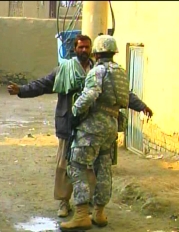 U.S. soldier searches suspect in |
We can say that they are not national police, but that they are the same militia which took part in the civil war and have links with terrorist groups, only their uniform has changed. Most of them are the supporters of those commanders who had militias in the 1990s, in the same way the Afghan National Army is not a reliable and viable Army; most of them come from Northern Afghanistan, especially from the remnants of the Northern Coalition of Afghanistan who seized power after the defeat of the central government in the 1990s.
Intelligence in Helmand is very weak, even though Helmand has well-trained Intelligence officers, but unfortunately a shortage of economic support and a lack of new technology for use by intelligence departments has made it difficult to track and prevent terrorist activities. It is important for the government of Afghanistan to generally upgrade their intelligence department, particularly the intelligence department of Helmand, which is facing more problems than other provinces in Afghanistan.
There should be a neutral national police on the same lines as the Army. The current effort which is going on to encourage the local elders of Helmand to send their family members to the army and police are very important but it needs steadiness and patience and the government must fully train the police and army in a proper way and provide them with enough military equipment.
The international community and the Afghan government should try to start training loyal Afghan security forces and equip them with new and modern weapons, including the activation of the Afghan air force; that would help a lot in stabilizing the country and securing the people. It would be very effective for Britain to support the Afghan security forces and use them during the fight with insurgents, because if British troops take part in face to face fighting with insurgents and arrest operations, that will remind Afghans, especially the Afghans of the southern region, of their past history.
In conclusion, I would like to emphasize that Afghans are a very brave and honest people; if they are provided with the basic necessities of life and keep their honor they will mainly do without other advantages as they have many times in the past.
Written By: Zmarial
E-mail: zmarial@gmail.com
More Afghanistan Coverage
Articles for June 25, 2007 | Articles for June 26, 2007 | Articles for June 27, 2007


googlec507860f6901db00.html



Terms of Service | Privacy Policy
All comments and messages are approved by people and self promotional links or unacceptable comments are denied.
Charles Bennett August 22, 2016 3:42 am (Pacific time)
I had the privilege of working with the author as part of a team in Helmand in 2006-07 and so saw this article just after he had written it, and when I was leaving or had already left the Province. He is an outstanding man and one of those few people with intelligence, education, and integrity working in the true interests of Afghanistan and its people who as all too often has been ignored (at best) by foreigners intervening in Afghanistan who prefer to play what they think are clever games with the corrupt, criminal, and incompetent gangsters who generally run things - there are a few honourable exceptions among both groups, but not many. Unfortunately having made use of his dedication, knowledge, and talents British officials later let him down appallingly when the corupt and criminal local administration 'punished' him for keeping the PRT in Lashkar Gah informed of what was really going on. It is sad that on re-reading this years later one can only say that things have gone from bad to worse, and then to much worse again, in Helmand as in much of Afghanistan. I learnt a great deal from Saleem and some of his colleagues and it is shameful that they have been betrayed by those who claimed that they were trying to help Afghans improve things. I am not one of those who assumed that any western involvement in Afghanistan was necessarily doomed to filure from the start, but it has proved to be a terrible waste of Afghan and foreign lives and money, and to have achieved virtually nothing in spite of the potential for improvement that, as the author points out did exist, terribly difficult and complex though the situation was. It was bad enough that most of the British, Americans, and other foreigners involved were ignorant of the country and society that they were working in and made no serious effort to understand it, but unforgivable that they rejected knowledgeable and sensible advice from those who were both well informed and well intentioned when it was available, and continued to pretend that they knew best when in fact they knew little or nothing.
Henry Clay Ruark December 17, 2009 9:13 am (Pacific time)
So "eradication" appears to be costly ? We already paying nearly $60,000 per minute and making absolutely no progress ! Here's link to insightful, detailed, documented report from observer: http://www.tomdispatch.com/blog/175179/ SO "see with own eyes" re costs now prevailing --and THEN reconsider remote-spray by assassination/plane now on hand and working nearby...
Henry Clay Ruark December 17, 2009 8:59 am (Pacific time)
Surely "poppy" rules there, with tribal tradition clearly overwhelming transition to a real democracy at any level. Since we control drone aircraft now capable of our use of selective very-sudden assassination, why NOT spray toxic poppy-killer broadly, thus smashing all resistance based on its lush profits ? Resulting chaos should force precisely the kind of broad economic, social, cultural collapse we faced here from slavery and all its embattled institutions, Since civil war already well underway there, that's not a consideration -- only good can come from further final fully discomposing action forcing all right back to survival, to "begin the world again". Perhaps only overwhelming further disaster, demanding dramatic cooperative care for all by any means possible, may be the only solution here. When all-together, everyone all-at-once faces starvation and death after an ultimate disaster, that undeniable reality might trigger more human response even than the profits from "the poppy". Total rescue costs from rest of the shocked world might even bring on more rational, reasonable actions than simple continued eroding warfare. Does any rational person now expect any effective solution short of sudden surgery to snatch away "the poppy"? If so, please detail plan here for all to explore...
Gene December 16, 2009 8:08 am (Pacific time)
Excellent piece. I ran the PRT in Helmand for a while in 2004-2005. This piece is very accurate and captures the essence of Helmand. written
catherine August 28, 2008 2:35 pm (Pacific time)
Nice...great job keep it up man!
catherine August 28, 2008 2:37 pm (Pacific time)
well done.. great job, i my self , have benifited alot from this article u answered my questions:) thanks zmarial!
Noorullah Musleh November 26, 2007 10:56 pm (Pacific time)
Please give more information about every provience of Afghanistan and also tell about the tyrany of American in Afghanistan.
James Burgoyne/Sudbury July 3, 2007 8:28 pm (Pacific time)
I came to this story from Skyreporter.com. I am extremely interested in background reports from Afghanistan, especially since the mainstream media and our western governments appear to be consealing vital information to the public. There has to be away to have these inspired journalists to come together and present a series on television so that our governments are forced to acknowledge what is really going on in Afghanistan publically. Not only for the misuse of our tax dollars, but the failure to adequately protect our troops we have sent on a supposive mission to do good. Zmarial, thankyou for this insightful article. It has provided me with many avenues to do further research into ways of trying to achieve peace in Afghanistan. I can ask my government representative informed questions as to why they are not pressuring the US and Afghan governments to apply your reasoning to improving the situation in Afghanistan and the lives of the people there.
S.LaMarche; June 27, 2007 5:33 am (Pacific time)
So at the end of the day the guy wants the moon secured? The task is impossible.The article excellent and thanks S-N.
Waheedullah Aleko June 27, 2007 12:59 am (Pacific time)
It is quite informative; I found many facts about Helmand. However, I believe that it should be categorized in order to be able to attain and sustain the attention of the readers. I can see that the topic is wandering between different subjects which can easily confuse and lose the interest of the reader. A proof reading should be done so to eliminate and avoid unnecessary phrases and make it brief and to the point. Due to the length I wasn’t able to read it completely; these are just my primary thoughts after reading some of the paragraphs. I have saved the URL to my favorites and would revert to it to read it completely and would let you know for any further comments. Nevertheless,It is very good initiative…keep it up. Best regards waheed
Najeeb June 26, 2007 10:26 pm (Pacific time)
Thats a perfect revelation - the secrets that had to be unveiled are finnaly uncovered to a large extent in this Inside Look! - I myself, have benifited a lot from this article. thanks salim
The Editor June 26, 2007 7:43 pm (Pacific time)
Raven, we will do that, and we couldn't agree more about how fascinating it is to have this type of an inside look, thanks.
Raven June 26, 2007 6:27 pm (Pacific time)
Can you leave this story up a bit longer than normal. It is long but very interesting. Would like to be able to finish it later.
[Return to Top]©2026 Salem-News.com. All opinions expressed in this article are those of the author and do not necessarily reflect those of Salem-News.com.